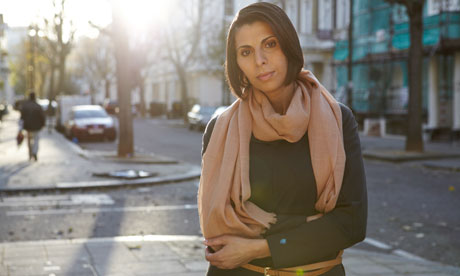'Police put the phone down on my complaint over Twitter racial abuse'
Action is taken when Premier League stars suffer online attacks but when I was in the line of fire officers 'terminated' my call for justice

- The Observer, Sunday 20 November 2011
- Article history
 Freelance Journalist Nabila Ramdani. Photograph: Andy Hall/ For The Observer
Freelance Journalist Nabila Ramdani. Photograph: Andy Hall/ For The ObserverWhen is it permissible for men to claim publicly that a respectable woman from an ethnic minority is an immigrant prostitute?
According to DS Steve Worthington, of London's Paddington Green police station, any time is a good time, especially if the accusations are expressed in the kind of knockabout vernacular favoured by poisonous mobs. Lots of us have Twitter accounts nowadays, and there is nothing better than a bit of racist misogyny to liven up those dull in-between moments, is there?
Disturbing as it may sound, these were the conclusions I drew after reporting a hate crime to Scotland Yard this month. I had received a few abusive tweets too many on the social networking site, and decided to do something about them: not because I am a spoilsport or humourless, but because I object to family and friends reading comments about me which are not just wicked, but against the law.
My complaint – which I'll outline shortly – appeared a certainty for a swift investigation and prosecution. In the past few weeks alone, no fewer than three Premier League footballers have instigated police action against offensive tweets. Sunderland striker Fraizer Campbell was called a "big fucking nigger". The n-word was also aimed at Newcastle forward Sammy Ameobi.
Commendably, Northumbria police investigated immediately, even though the tweeters were using "anonymous" accounts (the holders did not use their real names). Two 17-year-olds have been arrested in connection with the Ameobi case and now face prosecution. Both were traced relatively easily through their internet service provider.
Proving that London forces are as concerned for the welfare of 6ft-plus multi-millionaire footballers as those in the north-east, detectives traced a tweeter who called Queens Park Rangers defender Anton Ferdinand a "fucking black cunt". This, of course, was linked to a high-profile case in which England captain John Terry is accused of abusing Ferdinand in person. Nothing like a couple of household-name sportsmen to get the Met agitated, is there?
I am by no means a celebrity, or even vaguely well-known, though do appear on TV occasionally as a journalist specialising in Anglo-French affairs, Islam and the Arab world. I am in my early 30s, from a cosmopolitan background, and well educated enough to hold well-informed views on a number of contentious issues. In short, I am just the kind of woman who becomes an immediate hate figure to a particularly vindictive type of male internet warrior.
When I first started receiving critical messages from people – via email, underneath my articles on the internet, or on sites like Twitter – I replied. The democratisation of the global media has created a hugely dynamic debating forum, and the majority of those participating are as courteous as they are articulate. I grew up on a council estate renowned for its lawlessness and have reported from war zones. I know exactly how to stand up for myself in fraught situations and will debate anything with anyone.
But when a "whore" hashtag (the device used to signal a discussion on Twitter) appeared against my name, everything changed. What distinguished the two men using the word (and its variations) was not that they wanted an argument, but that they wanted to attack me as viciously as possible. They spiced up their principal insult with as many sexual allusions as they could fit into the 140 characters that Twitter allows.
The senders were not difficult to track down. One has delivered more than 2,000 tweets to date and is linked to a London university. The other is a Conservative party activist from the home counties. He has only 68 followers after sending more than 4,000 tweets, but that is not the point. Both men are conventionally "respectable", but consider it permissible to fabricate obscene claims about women they have never met, and to re-tweet them to as many of Twitter's 200 million users as possible.
I recognised the style and content of the tweets as being similar to posts about me that had been flagged up to moderators on other sites. The language was clumsy, and often pompous, but underpinned by extreme personal loathing. Their lies were not only sent directly to those closest to me, but also to my employers.
These men are Brave In Cyberspace, or BIC, as I now refer to them. Their world view – formed as it is in front of a computer screen rather than by interaction with real people – is dogmatic and extreme. I doubt my tormentors have ever met, but they post self-congratulatory guffaws and exclamations as they praise each other's writing. They are self-styled masters in inciting hatred or worse against allegedly inferior types, especially women from foreign backgrounds. They are as persistent and menacing as any kind of stalker.
Not that the Met cares. When a colleague first called the Yard on my behalf, he was told that stations in London were "very busy with tourists" but that someone would get back to him within 48 hours. When making his first reminder phone call, three days later, he learned that police officers now routinely use the expression "if you carry on, I am going to terminate this call", especially to those expressing anxiety that a crime has been committed.
After numerous false starts, police arranged for me to visit Paddington Green, where I met station officer Tony Beach. He was polite but largely dismissive, admitting that he did "not really understand Twitter". This seemed odd, considering that almost every force in Britain now uses it as a crime-fighting and public information tool. He did not take a single note, and told me that he would "discuss the matter with a senior officer to see if it was worth pursuing" and get back to me.
This was where DS Worthington came in. Five days later he called and curtly told me that the case was being dropped before anyone had even begun investigating. Not only did he consider that calling a woman a whore might not constitute a criminal offence (speculation I found particularly disgraceful, especially as he seemed to have formulated it in around 30 seconds), but that it would "take weeks" and "mounds of bureaucracy" to deal with the matter.
He pointed to the possibility of the posters saying they had not sent the tweets in the first place and had been hacked (such a defence is absurd, as the men have to date made no effort to remove the criminal tweets, and are clearly posting as themselves).
In short, Worthington did not believe that the 1988 Malicious Communications Act covers relative unknowns like me. The legislation, which makes it an offence to send any material likely to cause stress and anxiety, can earn offenders a six-month prison sentence. Worthington thought there would be too much work involved, and that the criminals might lie to try to get out of trouble.
When I suggested that all of the above was part and parcel of crime detection, and that his colleagues would undoubtedly have taken action if I was playing for QPR, Worthington adopted an ominously officious tone: "I know all about the footballers. You are challenging my authority."
I was doing anything but. I know lots of people – and not just women working in the media – who are abused daily on the internet. Both the technology and legislation are there for these so-called trolls to be found and punished.
If the police started to deal with this increasingly unpleasant problem quickly and fairly, it could be stigmatised in the way that abusive phone calls have been.
Instead, my exchange with Worthington made it clear that his force's view of internet hate crimes extends solely to famous people. If prosecutions supporting much-vaunted anti-racism initiatives attract politically correct headlines, so much the better. Ordinary people, meanwhile, are ignored.
"If you carry on, I'm going to terminate this call," said Worthington, as I tried to discuss all this with him. He duly hung up on me, bringing my complaint to an abrupt halt.
Worthington's message was clear and unambiguous. If you are racially abused or suffer similar attacks on a social networking site, and think that you might be entitled to some Premier League justice, just remember this about the police: they won't give a tweet.
2011-11-20
'Police put the phone down on my complaint over Twitter racial abuse' | Technology | The Observer
via guardian.co.uk